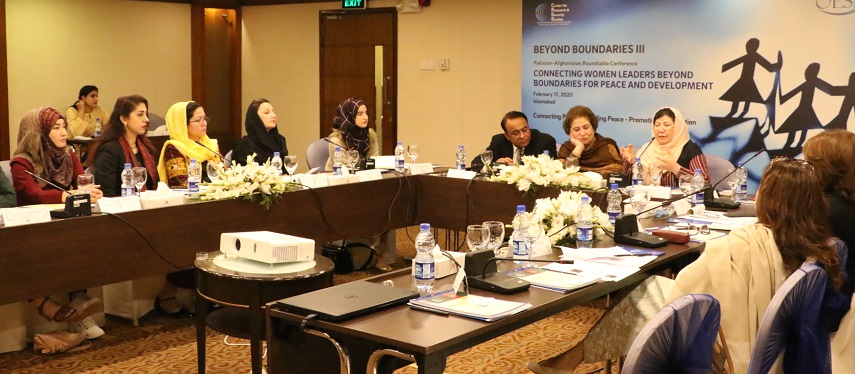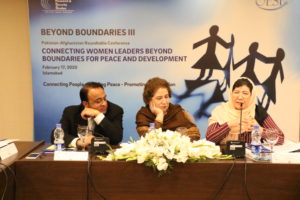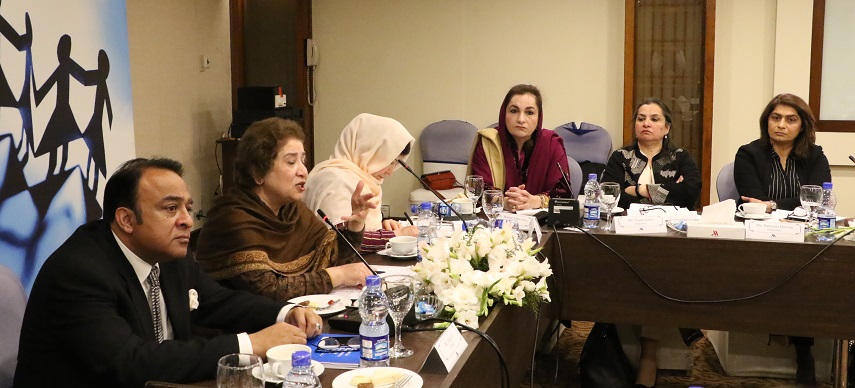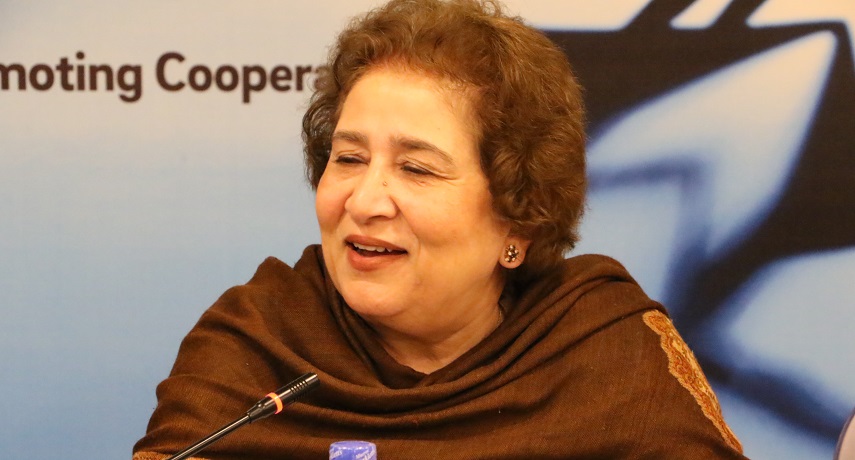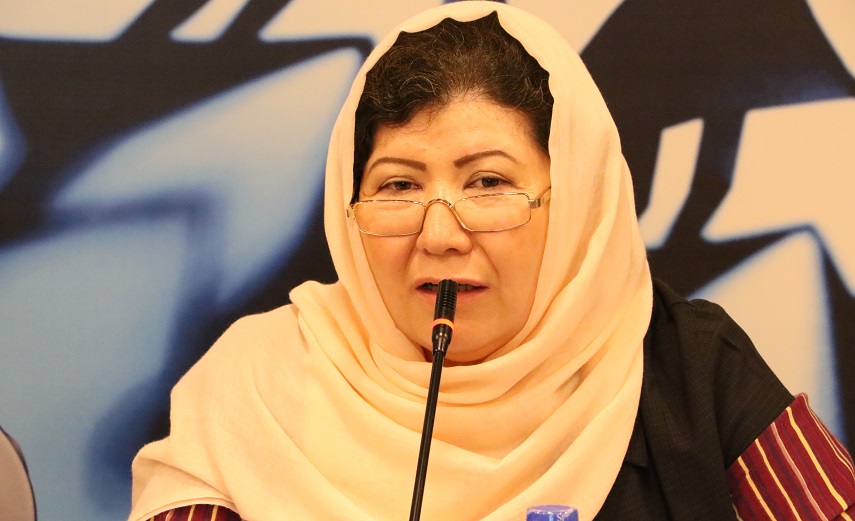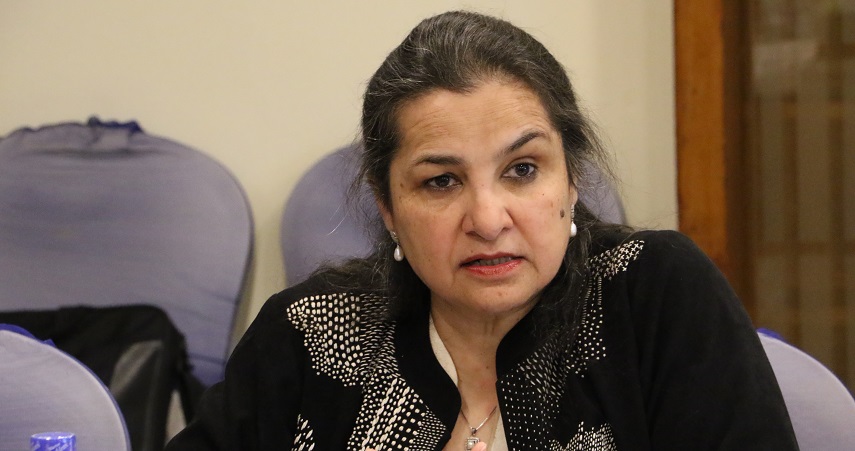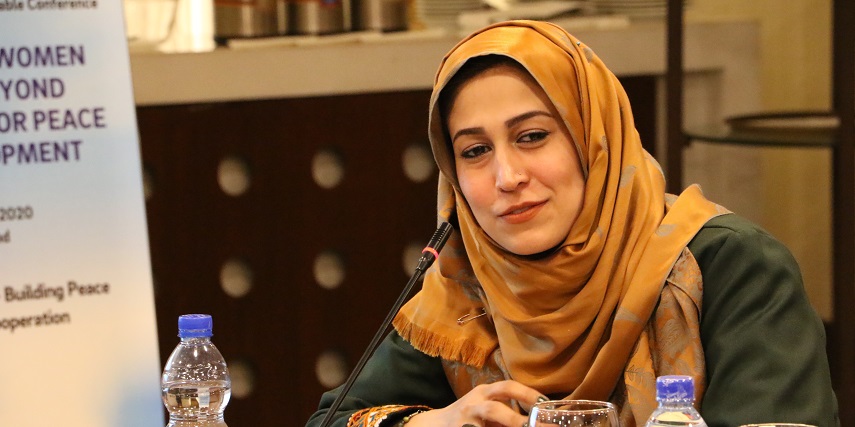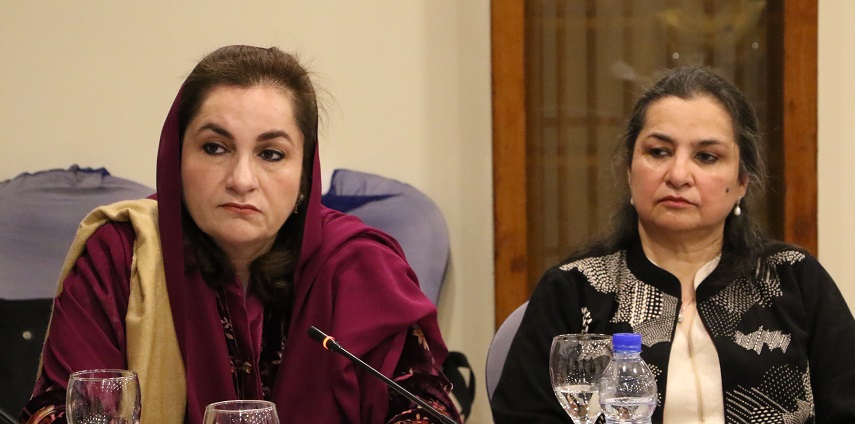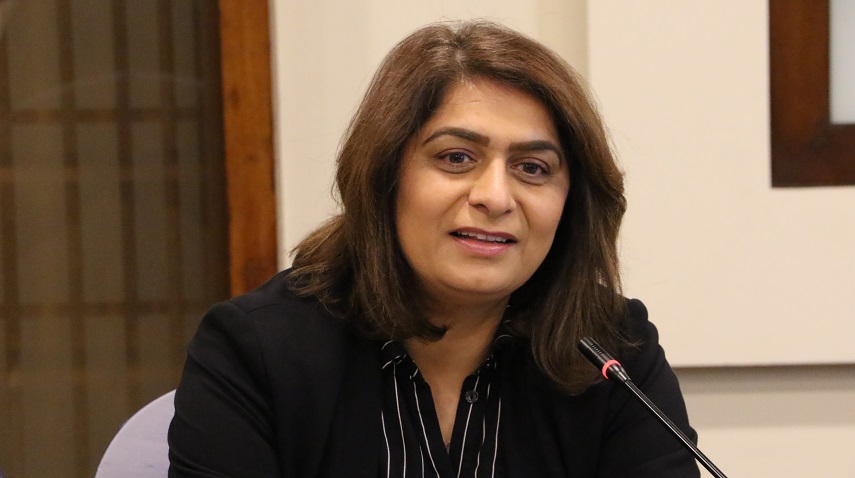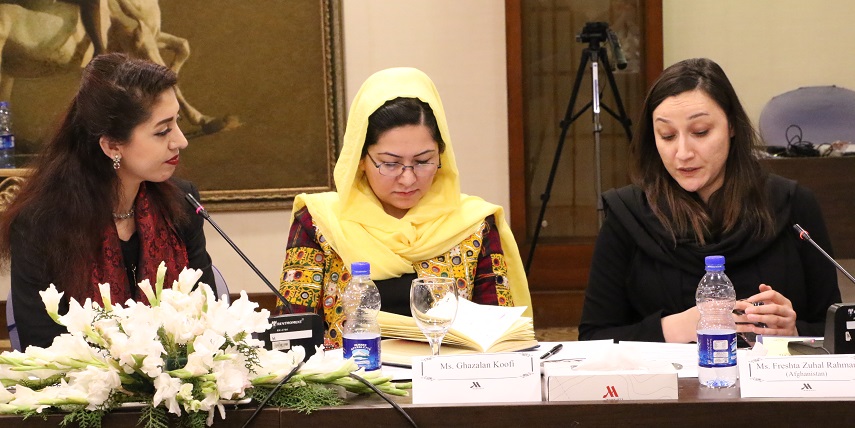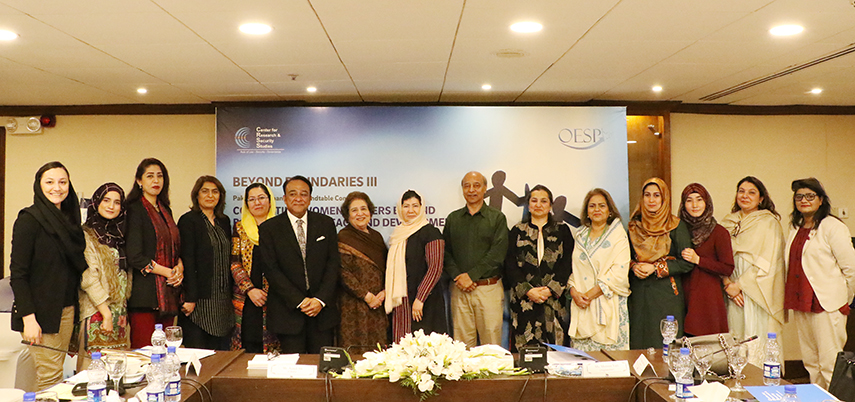On February 17, 2020, the Center for Research and Security Studies (CRSS) in partnership with its Afghan counterpart, Organization for Economic Studies and Peace (OESP), as part of its ongoing track 1.5/II initiative “Beyond Boundaries”, organized a Pakistan-Afghanistan Women-Leaders Roundtable Conference on ‘Connecting Women Leaders Beyond Boundaries for Peace & Development’ at Marriott Hotel, Islamabad.
Headed by Ambassador Riffat Masood, the Pakistani delegation included Ms. Mehnaz Akber Aziz, Member of National Assembly; Ms. Nasim Zehra, Senior Journalist and Anchorperson; Ms. Sameena Durrani, Senior Development Professional; and Ms. Samima Durrani, Development Professional and Independent Consultant.
While the Afghan delegation included head of delegation Ms. Momina Yari, former Director of the Justice Department at the Ministry of Women’s Affairs, and former Commissioner of the Independent Election Commission of Afghanistan; Ms. Freshta Zuhal Rahman, Professor and Attorney at Law, Partner at Rosenstock Legal Services and Arbitrator with the Afghanistan Center for Commercial Dispute Resolution; Ms. Zahra Furmoly, Afghan Journalist and Production Director at National TV (Radio Television of Afghanistan); Ms. Ghazalan Koofi, Founder of Afghan Movement of Social and Economic Development Organization; Ms. Safia Ibrahimkhel, UNHCR Global Youth Advisory Council Youth Peace Ambassador.
Women delegates from both countries discussed women’s role in peace-building and socio-economic development, their empowerment through education, capacity-building and employment opportunities, their role in the media, promotion of business cooperation between women entrepreneurs, and how women on both sides can collaborate by building on cultural and social commonalities.
In his opening remarks, CRSS’ Project Director, Mr. Aized Ali, apprised both the groups on the ongoing Track 1.5/II initiative “Beyond Boundaries” of CRSS which has held 17 high-level meetings between the two countries so far, in addition as part of Beyond Boundaries two youth leaders summits have been held, one in Kabul and one in Islamabad, while a women-leaders visit of a Pakistani delegation was held in Kabul in December 2019. Stressing on the importance of including women and the youth in all processes concerning both countries, he stated that the role of youth and women is very critical for every country’s progress and development. More so in the case of Afghanistan and Pakistan where the women make 50% population in both countries while the youth, as per the UN figures, constitutes more than 60% for the age of 18-30 in Pakistan and more than 70% in Afghanistan. The youth and women, therefore, he said, can really be the future ambassadors of peace and agents of change for social and economic development in both countries.
Ambassador Riffat Masood, the head of the Pakistani delegation, in her opening remarks, warmly welcomed the Afghan women leaders’ delegation, terming the group as talented, outspoken and empowered Afghan leaders and stating that there is a lot that the two groups can learn from each other. Stressing on the importance of initiatives such as Beyond Boundaries in bringing civil societies together and facilitating constructive interactions, she hoped that the existing mistrust can be mitigated through more people to people contact and platforms like these can pave the way for development and peace through dialogue and possible collaborations.
She stated that, while like many neighbors around the world, Pakistan and Afghanistan have also faced competition, rivalries, and difficulties in the face of many decades of war, conflicts, blame-game, and both human and economic losses. As a result of this, the relations between Pakistan and Afghanistan have remained tense even though the two have many commonalities that could be built on to overcome their differences. However, thankfully, the people of both countries have now come to the realization that it cannot go on like this anymore and that both need to go back and redefine their national interests. She stated that she has observed a very positive turn in bilateral relations in the recent years.
Specifically, on the role of women in both countries, Ambassador Masood pointed out that, as in any conflict around the world, somehow, the victims are almost always women and children, and such is the case in both Pakistan and Afghanistan. In these countries, additionally, even after the conflict has passed, the women, if not economically empowered, continue to be victims when their breadwinners have been killed. While, at the same time, when it comes to decision-making and conflict resolution, unfortunately, women remain in the backseat. Though, she pointed out that this phenomenon is not specific to the Pakistan and Afghanistan region alone. She went on to affirm that she was pleased that the governments in both countries had realized that women have to play an important role when it comes to peace and development and, again, commended efforts such as CRSS’ in materializing such a platform.
She also added that, while education and empowerment are great words, women need to be practically engaged in decision-making affairs of the two countries. She quoted Margaret Thatcher as saying “if you want to discuss something, ask a man, and if you want something to be done, ask a woman” and affirmed that the women in both countries need to come to the forefront and play a proactive role in peace-building, whether through the media, development sector, education or politics.
Ms. Momina Yari, the head of the Afghan women delegation, seconded Ambassador Riffat Masood, stating that the governments and policy makers in both countries should never forget this big portion of the population. She stated that if the women collectively raise their voices through such platforms, representing women from all walks of life, such as business, politics, education and the civil society, their voices will be stronger and they will be able to bring positive changes in the society. She also commended the efforts of CRSS in providing such a platform for the women of the two countries.
Ms. Nasim Zehra, a senior Pakistani journalist, stated that it was not just about women that women leaders had gathered on the forum. Rather, it was a way to mainstream their voices on every issue and aspect of life in both countries. In the context of Pakistan and Afghanistan relations, she said, there is a huge historical baggage, unfortunately. However, the two sides need to really progress and move forward by building on the positives. Sharing her experience, she stated that she had been part of many mainstream security dialogues generally, though not specific to Afghanistan and Pakistan, and noticed that the norm usually is a lot of bickering and blame-game. In the process, she said, a lot of opportunities are lost. “I think it is a fact historically that women are more positive and constructive. This is not gender biased, but I think there is more sensitivity to understand better and potentially women can play that role,” she pointed out.
Comparing the situation in Afghanistan during the Taliban’s rule when she visited the country to what it is like now, Ms. Zehra stated that Afghanistan has taken a huge step forward in these decades. Keeping that in mind, she said, now there is the need to mainstream voices, whether it is through women role models or such platforms which are needed for women in both countries. One of the challenges that both Pakistan and Afghanistan face is breaking out of the mode of continued blame-game. The destinies of Pakistan and Afghanistan are really intertwined which is why the role of women is very critical where they can meet and play their role in very specific activities.
Afghan delegate, Ms. Safia Ibrahimkhel, commended CRSS’ efforts in organizing the conference and stated that there is a sentence that always comes to her mind when she thinks of her role in the society, “Make me the master of education and I will undertake to change the world.” In her view, she said, education was the only solution. “When a conflict or natural disaster erupts, it is the children and women that are at the forefront getting affected. Education is the only life intervention that provides security and saves their future,” she said. “Being a student, I personally believe that we should emphasize on education a lot because education is not only the training of the mind but it is also a training on what is important not only for women but also for men regarding what is wrong and right for the society. Unfortunately, women are deprived of education in the most parts of both countries. That is one of the factors that people in such areas do not allow women to raise their voices in the decision-making and policy formulation of the society. Even though, these policies and strategies ultimately affect the women as well,” she said. Hence, the promotion of education in both Pakistan and Afghanistan, especially in the areas which are affected by war, is very important, she concluded.
Pakistani delegate and Member of National Assembly, Ms. Mehnaz Akber Aziz, welcomed the Afghan delegation warmly and stated that the value systems and issues faced by women are similar in both countries. Though, the difference in Afghanistan is that the country is suffering from war and an insurgency from the Taliban. She said that the women need to play a proactive role in the peace-building process as well, as they are the real peace-builders. Furthermore, it’s not only about women getting educated, but women to become the educators as well, she said. Hence, the role of women is important at all levels.
Quoting Ambassador Riffat, Ms. Aziz stated that the peace process has been fairly hindered by a lot of bitterness. However, both sides now need to focus on what they have been able to achieve together. As we near the peace treaty being signed between the US and Taliban, Ms. Aziz stated that, Pakistan and Afghanistan need to look at how the conditions in the treaty will impact the women of not only Afghanistan, but consequently Pakistan, as well as the region at large. She went on to say that anything negative for Afghanistan is negative for Pakistan as the two have a long border and the same tribes living along these areas and their daily exchanges.
Ms. Mehnaz then stressed on the importance of equipping women in both countries with the required skill sets in every field. Being an educationist, she said, she is only able to play a more tangible role in the area of education policies in the parliament due to her technical expertise. To reach the true potential of women-to-women cooperation in Pakistan-Afghanistan relations, Ms. Mehnaz proposed to create groups of women working together, such as, parliamentarians on both sides should collaborate their efforts, educationists on both sides come together and plan possible exchanges of research and ideas, women working in the area of sustainable development goals, civil society activists, and so on, she said. She suggested that women in these different areas can link up and work for an end goal together. If women will be in key decision-making and leadership positions, they will be able to bring about a constructive change.
Afghan delegate, Ms. Freshta Zuhal Rahman; Professor and Attorney at Law, pointed out that the women in Afghanistan have made commendable achievements in the past two decades. Since the Taliban regime, women have used small opportunities to achieve big; including access to health and education. Women have the right to apply for international scholarships, avail employment opportunities, have the right to participate in elections as a candidate and a voter, while the constitution of Afghanistan also safeguards the equality of men and women with the same rights, which are some significant achievements for the Afghan women, she said.
Additionally, there is also a law on violence against women in Afghanistan, and many women in Afghanistan now have leadership positions in the civil society sector, ministries, parliament and serving as directors of NGO’s and INGOs, she said. Further, women also have their own companies, run their own businesses and play an active role in the media. She said all these achievements could not have been possible without the support of the international community.
As there is a peace process going on in Afghanistan, Ms. Freshta said, women worry that they are not involved in the process. Without women participation, there cannot be sustainable peace. Hence, the support of the international community, and particularly, Afghanistan’s neighbor, Pakistan, is needed to raise the voices of the Afghan women, she said. She affirmed that the women in Afghanistan would have to work hard together to have a single voice in order to have meaningful participation in the peace process.
Ms. Sameena Durrani, a development professional in Pakistan stated that in the peace building process since 2000, when the UN Security Council Resolution 1325 was passed, Afghanistan was the first country in the region that had its own National Action Plan on 1325 dealing with women in conflict areas. As a result of this, women were represented not only in the parliament but also in the High Peace Council. Interestingly, Pakistan has to learn from Afghanistan in this case as it still does not have the National Action Plan on UN resolution 1325 yet. However, she also pointed out, that under this National Action Plan, Afghanistan also needed to include women in the peace process.
Underlining the role women are capable of playing in mitigating conflict, Ms. Durrani quoted the two very successful examples of the Northern Ireland where women came together to bring peace to the community and Liberia where women mobilized the communities and brought together the religious clergies. She stated that while Afghanistan, unfortunately, has been in active conflict, Pakistan, has been through difficult times for the past three decades as well. Therefore, the inclusion of women perspective in peace dialogues in both countries is important, especially as women represent 50% of the population in both countries.
Ms. Ghazalan Koofi, Founder of Afghan Movement of Social and Economic Development Organization, while sharing her views, reiterated that women should not only be participating in the peace process, they should have full involvement too. Currently in Afghanistan, she stated, while women have participation, they do not enjoy real engagement. This is mostly due to lack of skills or the lack of representation of Afghan women in the peace process, she said.
Ms. Zahra Furmoly, Director of Production at National TV in Afghanistan, while discussing the role of media in empowering women shared that, unfortunately in Afghanistan, the Ministry of Media does not strategically monitor what is being broadcast and how it affects the general population. As an example, she stated that the Indian dramas that are broadcast in Afghanistan portray women as being dependent on men where they are mostly in the roles of housewives married to businessmen and crying at home all day. As Afghan women watch such shows, they start to follow them as role models. On the other hand, she recalled watching a Pakistani drama called “Zindagi Gulzar Hai” which portrayed a strong woman and, in her view, had a positive impact on the women viewers in Afghanistan. She stated that, thus, the government should play an active role in monitoring what is being broadcast in the Afghan media to decide what the role of the women should be in the society.
In response, Ms. Nasim Zehra stated that in Pakistan, the situation of women in media sector had never been like in Afghanistan. Women had been working in the print media prior to joining the electronic media since decades. A lot of the women anchorpersons started as newscasters or reporters before becoming successful anchorpersons. While there have been harassment cases, but the women have been dealing very well. Women working in the media have WhatsApp groups where they are constantly in touch and they immediately bring to the spotlight, any harassment case or discrimination. So, staying together and being there for each other is very important, she stressed. And this is what Afghan women should learn from Pakistani women working in the media. Legislation is very much important to stop harassment of women at workplace. Fortunately, we have laws against harassment of women at workplace in Pakistan, she said.
Participants further discussed the role played by women in politics in both countries, the challenges they have faced in the power corridors at the Parliament, the issue of reserved seats and other restrictions, prospects of women-to-women business cooperation, as well as the active role played by women in the parliamentary committees in Pakistan, particularly.
Ms. Nasim Zehra then proposed that CRSS and its co-organizers in Afghanistan could ensure the representation and participation of women from all walks of life, backgrounds and professions, such as law, business, trade, politics, education, media, environment and climate change and so on, and form sub-groups with very specific objectives where women can openly discuss subjects. This would bring down the mistrust and the fear factor which currently prevails in both societies. If women are brought together in ongoing activities like this, the outcome of that would be a different story that Pakistan and Afghanistan will share in the public space. Currently, in the public space, the stories that we share are really bitter, angry and upsetting. There is a need to change that, she said. The participants all agreed and hoped that the next gathering would be a two-day conference with subgroups holding focused discussions in key areas and coming up with tangible recommendations that can be translated into collaborative efforts that they can execute jointly upon their return to their countries and positions.

